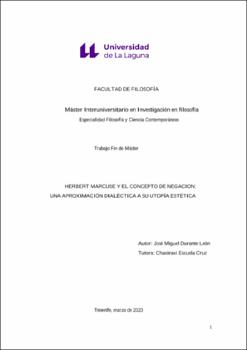H. Marcuse y el concepto de negación: una aproximación dialéctica a su utopía estética
Author
Durante León, José MiguelDate
2020Abstract
Este trabajo analiza la función de lo negativo en la configuración de la utopía estética marcuseana como posibilidad del cambio social. La tesis de este trabajo sostiene que la negación que subyace a la dimensión estética y su proyección utópica como rechazo de lo existente y creación de otro mundo posible permite superar la contradicción entre lo real y lo posible. La argumentación se desarrolla a partir del análisis de tres cuestiones: la dialéctica como método de aproximación a la realidad, la articulación de lo negativo como substancia del arte y, por último, la superación de la dialéctica como reconciliación de los opuestos que supone la reflexión estético-social marcuseana. Desde esta perspectiva de transformación del orden existente, coincidimos en la convergencia entre estética, ética y política. Comparamos por otro lado, la reflexión marcusiana con otras de su época que hayan podido influir, discrepar o converger con ella. Finalmente, concluimos con los rasgos definitorios de su reflexión y su influencia en la tematización de desarrollos teórico-prácticos posteriores This work analyses the role of negativeness in the configuration of the Marcuse ‘aesthetic utopia as a possibility of social change. The thesis of this work holds that the denial underlying the aesthetic dimension, and its utopian projection as a rejection of the existing and creation of another possible world, allows the contradiction between the real and the possible to be overcome. The argument is developed through the analysis of three questions: dialectics as a method of approaching reality, the articulation of the negative as the substance of art and, finally, the overcoming of dialectics as a reconciliation of the opposites that Marcuse' aesthetic-social reflection implies. From this perspective of transformation of the existing order, we agree on the convergence between aesthetics, ethics and politics. We compare, on the other hand, the Marcusian reflection with others of his time that could influence, disagree or converge with it. Finally, we conclude with the defining features of his reflection and its influence on the thematization of later theoretical-practical developments





